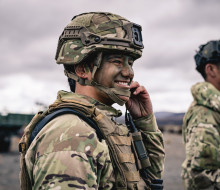
Keeping skills alive in transfer to Reserve Force
05 July 2024
Unfortunately you are viewing this website on an outdated browser which does not support the necessary features for us to provide an adequate experience. Please switch to a modern browser such as latest version of Google Chrome, Mozilla Firefox, Apple Safari or Microsoft Edge.
Ngā mihi nui
A passion for science and technology has steered Lieutenant Oli Cook on a career as a Navy Weapon Engineering Officer.
Lieutenant Cook, from Warkworth, is the Assistant Weapon Engineering Officer on board HMNZS Te Kaha.
He attended King’s College in Auckland, and says the idea of a Defence Force career popped up on his radar when a recruiting truck came to school.
“I ended up looking at the Defence Careers website for a while. I went to the University of Canterbury to study mechatronics engineering, and there was a careers expo there. The recruiter told me about the scholarships with the Navy, and said what I was doing was very applicable for a weapons engineer.”
He said it came at a time in his degree when you start thinking about jobs. “Once I had the bit between my teeth about the Navy I didn’t think of anything else.”
He joined the Navy in 2020, becoming a Navy Reserve Officer, and continued with his now-sponsored university studies. The Navy also provided LT Cook with the required internship time needed for an engineering degree.
He then undertook the 22-week Junior Officer Common Training to graduate as a Royal New Zealand Navy officer.
“It wasn’t an easy adjustment going from university to officer training,” he says. “It was a learning process to be humble and learn from mistakes. I soon came right.”
He really enjoys being at sea. “There’s so much variety. And I’m doing what I enjoy. I’m a big technology nerd. This trade is about science and technology, communication, radar theory, learning how acoustics work underwater, and explosive theory. We’ve got the five-inch gun. You really feel like you’re at the pointy end of things.”
When asked what his typical day at sea is, he says there isn’t one. “You wake up, do Physical Training, shower, have breakfast, check signals to find out about flagged defects and update our onboard database. You’re sending and answering emails. And there’s a lot of work during the day, because officers have a lot of ancillary roles – other jobs. On top of that is your task book. I’m working towards my competency certificate.”
His advice to others is something he’s learnt: be humble. “Learn from your mistakes and don’t take feedback personally. You only get out of this what you put in. You develop your leadership in training, but you really get to practise collaborative leadership when you’re at sea.”